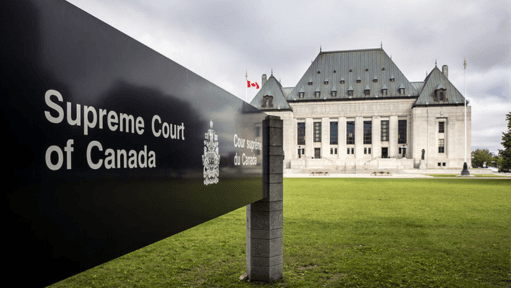
Supreme Court Sued for Refusing to Translate Historical Decisions into French
Droits collectifs Québec demands translation of historic rulings, citing violations of linguistic rights and the need for accessibility in both official languages.
The Supreme Court of Canada is facing legal action from a Quebec civil rights group over its refusal to translate its historic decisions into French. The group, known as Droits collectifs Québec, filed a legal notice with the Federal Court in Montreal on Friday after unsuccessful attempts to persuade the court’s registrar, its administrative arm, to translate over 6,000 rulings issued between 1877 and 1969, prior to the enactment of the Official Languages Act, which mandates federal institutions to publish content in both English and French.
The rights group’s grievance follows an earlier complaint made to the official language’s commissioner. In a recent ruling, Commissioner Raymond Théberge stated that while the law does not apply retroactively, all decisions available on the Supreme Court’s website must be accessible in both official languages. He deemed the lack of translation a violation of the act and gave the Supreme Court 18 months to address the issue.
Supreme Court Chief Justice Richard Wagner has expressed those decisions prior to 1970 are mainly of historical significance and described them as “legal cultural heritage” that has become obsolete with the evolution of Quebec and Canadian law. He stated that translating these documents would be an immense undertaking, requiring approximately a decade and an estimated cost of over $20 million.
François Côté, the attorney representing Droits collectifs Québec, argues that court decisions are not merely historical artifacts; they carry legal weight and implications that remain relevant today. “Even if the law has changed, legal principles and reasoning from these decisions still have significance,” he noted.
The group cites a landmark 1985 ruling by the Supreme Court that mandated the government of Manitoba to translate all provincial laws enacted since 1867, regardless of cost. Etienne-Alexis Boucher, the executive director of Droits collectifs Québec, questions why the Supreme Court is reluctant to translate its historical documents when it has compelled other federal bodies to do so.
While the Supreme Court enjoys judicial immunity, the lawsuit specifically targets the registrar's office, a part of the public service. A spokesperson for the Supreme Court declined to comment on the ongoing legal matter.
Boucher stated that the organization is seeking a public apology from the registrar’s office to Canadian francophones for not upholding their linguistic rights, alongside a declaratory judgment acknowledging the court’s error in refusing to translate its historical rulings. Additionally, the lawsuit demands a judicial order requiring the translation of these rulings within three years, carried out by legal translators rather than relying solely on artificial intelligence. The group is also pursuing $1 million in exemplary damages, with most of the funds directed towards organizations dedicated to preserving the French language.
Côté anticipates that it may take several months for the case to progress through preliminary stages, but he remains hopeful for a mutually agreeable resolution. “We are addressing the gatekeeper to the Supreme Court,” he said. “This is one of the highest institutions in our state, and it must adhere to the highest standards.”
For any enquiries or information, contact ask@tlr.ae or call us on +971 52 644 3004. Follow The Law Reporters on WhatsApp Channels